AEU SA
TEACHERS AT BREAKING POINT
YOU CALLED FOR ACTION!
The AEU Special Education Consultative Committee delivered
WELLBEING [FOR WORKERS] IN THE HOLIDAYS AND BEYOND
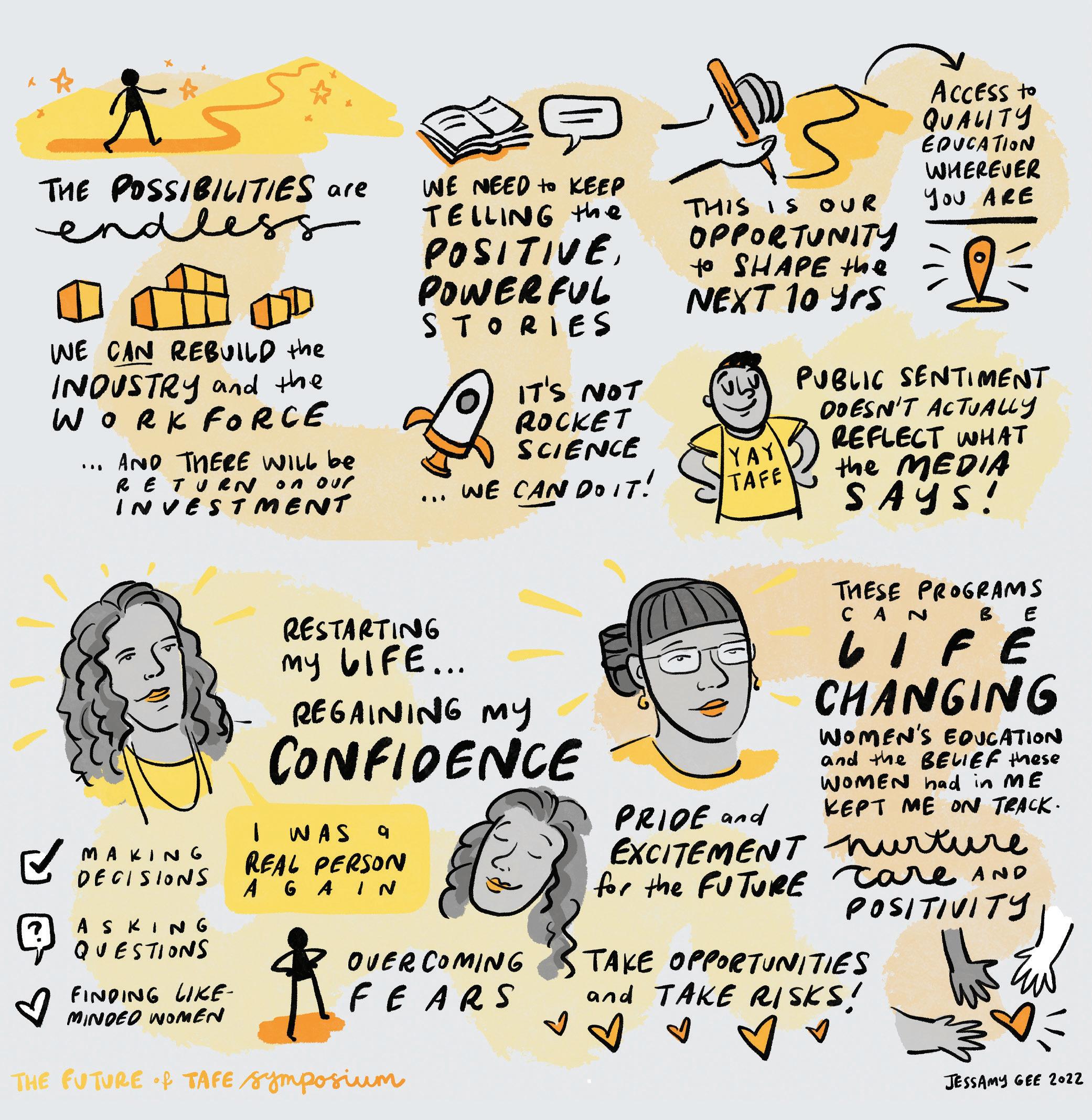
Journal FREE FOR AEU MEMBERS
Professor Alan Reid on the root causes of the teacher shortage crisis in South Australia
VOL 54 | #3 | DECEMBER 2022
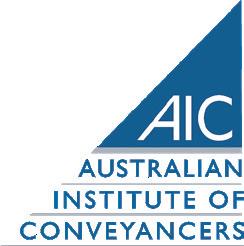



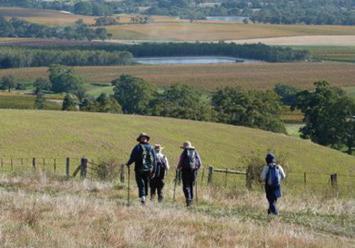

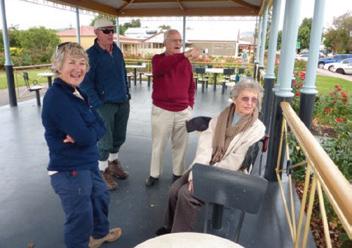





> Sale and Purchase of Residential Property > Preparation of Form 1s > Family Transfers > Private Contracts > Documentation for Private Mortgages > Applications to Register Death > Land Divisions > Change of Name Applications Free expert advice on real estate queries. If you are buying or selling or are involved in any real estate matter, either through a land agent or privately, consult us. Australian Education Union SA Branch AN INVITATION TO RETIRED OR RETIRING TEACHERS & SSOs Are you seeking opportunities to maintain or increase your level of fitness? Want to learn more about your city and surrounding hills and bush land? Our walks are organised at several levels: Rovers: 14-16 kms | Walkers: 8-10 kms | Ramblers: 6-7 kms The Retired Teachers Walking Group Inc. is affiliated with Walking SA - the peak walking body in SA. We walk in conservation parks, national parks, forestry reserves within the Adelaide Hills & Mount Lofty Ranges, Fleurieu Peninsula, suburban beaches and along the six creeks of the Adelaide Plains, the River Torrens Linear Park and other suburban, historic and country trails. It’s a great way to get to know your city and surroundings - as well as maintaining fitness! A camp is also organised each year in country areas within South Australia and Victoria. INTERESTED? CONTACT Co-ordinator: Carol Fallon: 0417 001 766 | dave.fallon@bigpond.com Secretary: Kym Wenham: 0412 408 568 | wenhams@adam.com.au Walking SA Rep: John Eaton: 8431 5460 | joneaton@bigpond.net.au DATE AND TIME TO BE ANNOUNCED IN 2023 FREE EVENT FOR MEMBERS EXPLORE CONTEMPORARY INDUSTRIAL, PROFESSIONAL AND WELLBEING TOPICS DIRECTLY RELATED TO EARLY TEACHING CAREERS OPEN TO AEU SA MEMBERS IN THEIR FIRST 3 YEARS OF TEACHING AEUSA.ASN.AU
Branch Secretary, Leah York on our new strategic plan
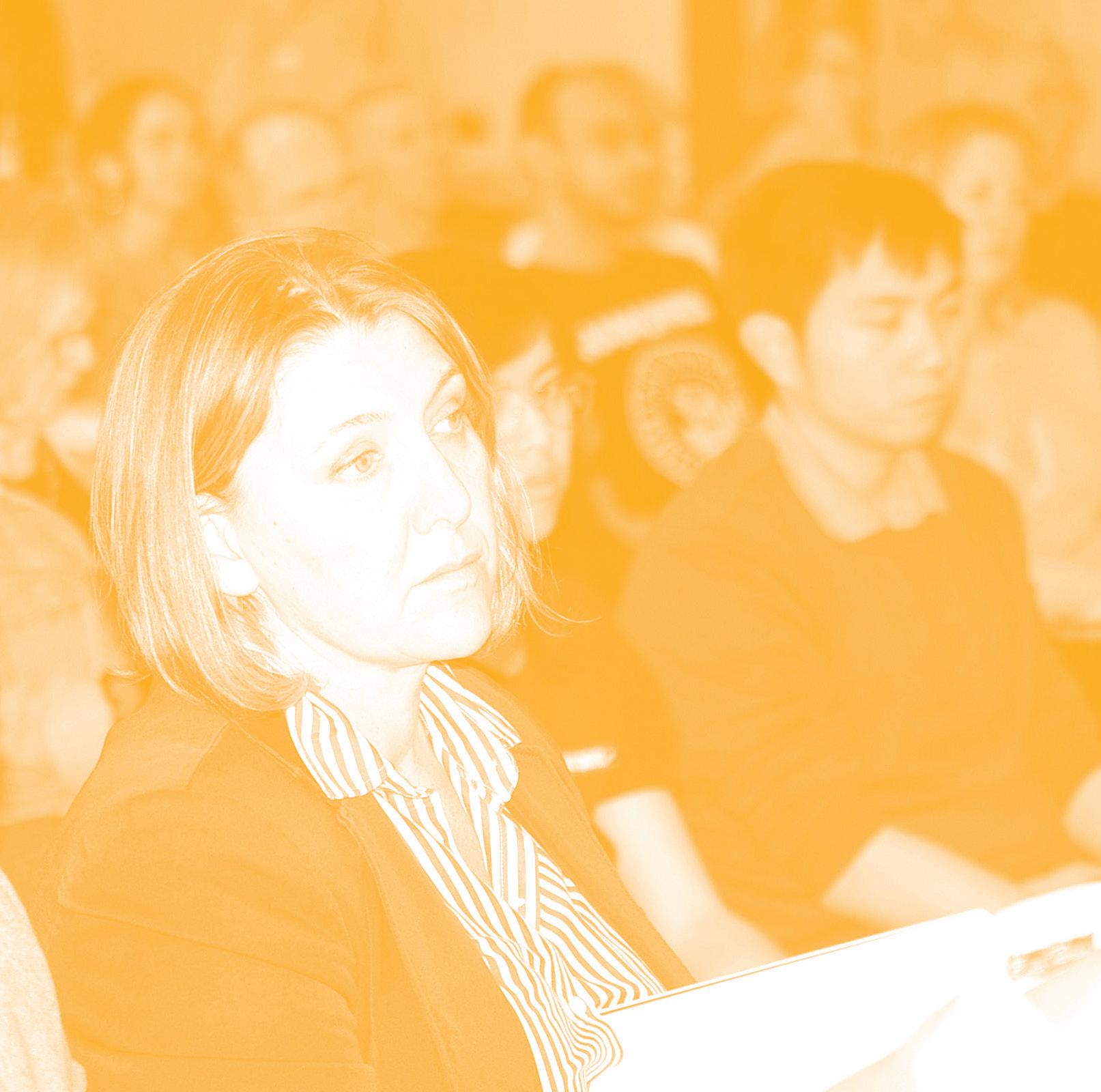
FIND YOUR PULLOUT POSTER ON PAGE 12
YOUR JOURNAL HAS A NEW LOOK
What better place to showcase exciting changes at your union. We hope you like it –send your feedback to journal@aeusa.asn.au
Editor: Barlow Redfearn | Design: Rachael Sharman Printer: Lane Print | PrintPost approved: PP 100000753 Print: ISSN 1440-2971 | Digital: ISSN 2207-9092
Australian
Kaurna Country, 163 Greenhill Road, Parkside SA 5063 08 8172 6300 journal@aeusa.asn.au aeusa.asn.au
AEU SA Journal | 3 CONTENTS
04 ENTERPRISE BARGAINING: THE EMPLOYER’S PLAYGROUND
President, Andrew Gohl outlines our bargaining claim 06 ONWARDS AND UPWARDS IN 2023
08
09
11 EVERY WORKPLACE DESERVES A COMMITTED
12 ELECTION TIME FOR SUB-BRANCH SECRETARIES AND REPRESENTATIVES 14 IMPROVING COUNTRY CONDITIONS
the crisis
regional schools 15 SUCCESSFUL CONVERSION TO PERMANENCY ACTIONS 16 YOU CALLED FOR ACTION! The AEU Special Education Consultative Committee delivered 17 TAFE SYMPOSIUM Building a Roadmap for the Future 18 BRAIN BREAKS 19 WELLBEING [FOR WORKERS] IN THE HOLIDAYS AND BEYOND 20 CELEBRATING 10 YEARS OF PRIDE AT THE AEU 21 THE FIGHT AHEAD FOR VOICE, TREATY, TRUTH 22 PROFESSIONAL LEARNING 90 | T E A CHERSATB AKINGPOINT | ALANREID What’s in this issue?
WHAT LIES BENEATH OUR CAMPAIGN TO #FIXTHECRISIS The campaign beyond enterprise bargaining
TEACHERS AT BREAKING POINT: WHY WORKING IN SA SCHOOLS IS GETTING TOUGHER Professor Alan Reid on the root causes of the teacher shortage crisis in SA
SUB-BRANCH SECRETARY A Sub-Branch Secretary's call to action
Matthew Cherry looks at
in
The AEU SA Journal is the official publication of the Australian Education Union (SA Branch).
Education Union (SA Branch) acknowledges the Australian Aboriginal and Torres Strait Islander peoples as the first inhabitants of the nation and the traditional custodians of the lands where we live, learn and work.
AEU SA Journal is free to AEU members Non-members subscription rate: $33 per annum
Enterprise bargaining: the employer’s playground
The AEU has consulted with members, both at our Public Education Forums and through recent research published by the University of South Australia, and we’re armed and ready to bargain. SA Branch President, Andrew Gohl looks at the current teacher shortage crisis and the three vital matters at the heart of our claim.
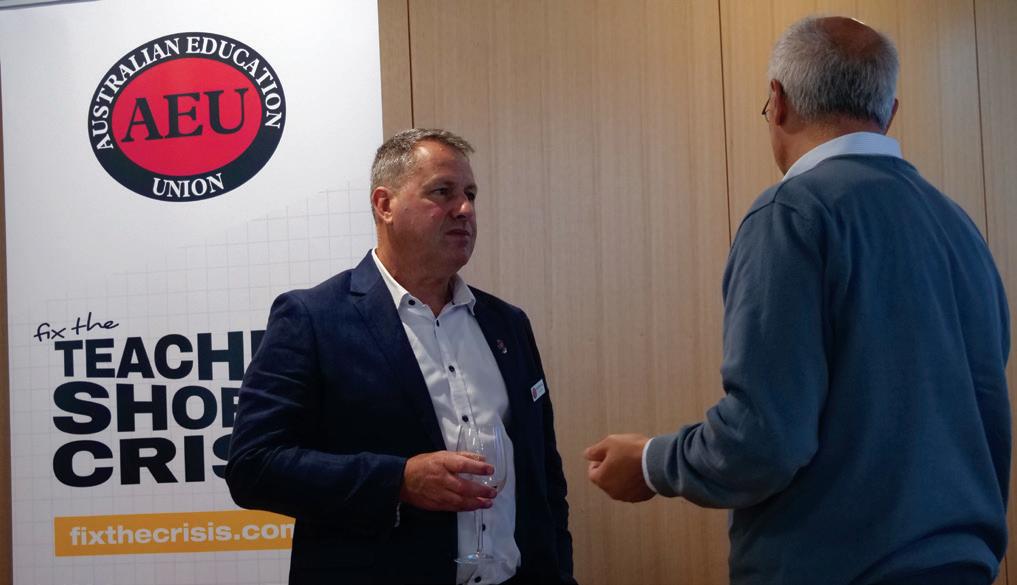
There are few things that come around with more regularity than enterprise bargaining. There’s been enough said and written by the union movement to know that enterprise bargaining as it stands is the plaything of the employer. The evidence is the stagnation of wages nationally through a time, prior to COVID and the war in Ukraine, when the economy was growing, and profits were up.
In the past our union has used enterprise bargaining as the catch all for a myriad of industrial matters that were tricky or unsatisfactory – over 100 separate matters last round. Few of these were achieved. The consequence has been a lack of strategic wins that advance the working conditions of educators in any significant way. In negotiating the last enterprise agreement, we were forced to march on the streets just to preserve AEU representation on Personnel Advisory Committee (PAC) and funding for student support. We marched to maintain conditions, and of course, we had to. Thankfully, we were successful. But our platform for bargaining this year looks very different. It will be a narrow claim that seeks to progress the working conditions of educators, because these are what undergraduates, new educators, and experienced teachers are taking into consideration when they decide whether to study teaching, whether to stay on, or whether to leave the profession entirely.
effective learning relationships with children to ensure they are provided with every opportunity to learn successfully. As we tend to put children first, sacrificing our own wellbeing for the sake of our students, our goodwill has been easily exploited. State governmentsLiberal and Labor alike - have pocketed billions of dollars in unpaid educator overtime over the past decade, all while piling on the demands and suppressing wage growth.
COVID has exposed the funding shortfalls of our public education system. Educators have papered over these cracks with blood, sweat and tears, but their goodwill is wearing thin. We are a guilt-ridden profession that values
The usual strategy employed by government is to block negotiations and wait out union action in support of a claim. They do this because they want members to lose their resolve and participation levels to decline. In the last day or so, reading Teachers of Adelaide, a comment posted said something like, “I hope the AEU will be strong in these negotiations.” We will be.
SO WHERE DOES UNION POWER COME FROM?
Members and potential-members must understand that union power is not derived from a campaign t-shirt, a marketing strategy, regular media appearances, a strongly worded letter, or table thumping during negotiations. The strength of the union comes from a membership made up of a collective of workers who are willing to withdraw labor, i.e. take industrial action when called upon. Some members will find that reality confronting. The AEU is strong because we have thousands of members who have historically been willing to actively campaign for a better future.
We should not take our collective strength for granted. Union membership is declining. This time around, there will be many potential members who will support our platform to make significant changes to working conditions, improve levels of student support, and ensure educators are paid what they are worth. Look at your workplace – every single potential member represents an incremental loss of union power, that’s valuable leverage lost at your workplace, and at the bargaining table. ‣
AEU SA Journal | 4 FROM THE PRESIDENT
For the AEU to be strong at the negotiating table, we need you to recruit more members. Most non-members simply have not been asked to join. We must build strong sub-branches and bargain for a better future.
HOW IS THIS TIME DIFFERENT?
Three significant documents have been produced that seek to address the teacher shortage crisis. These are the Federal Government’s Draft National Teacher Workforce Action Plan, the ideas gathered via our Fix the Crisis forums, and a comprehensive report from the University of South Australia entitled 'Teachers at breaking point.'
Three matters have been consistently identified through these reports, and will inform our bargaining position:
More time for quality teaching and learning
Members are clear. The cause of excessive and unsustainable workloads is the constant and growing demand for data and testing. This is the single biggest cause of stress, which has doubled in the last four years. Members want additional non-instruction time (NIT) with formalised periods for collaborating with colleagues. More time for supportive and critical professional discussions between mentors and new educators is also desperately needed. Leaders in preschools and schools want more time to be the educational leaders they envisaged when commencing a leadership position.
More support for students
Classroom complexity is cited as another major issue. Students have become more complex in their behaviour over the past decade and the number of students needing learning support has grown significantly. Much of the feedback we’ve received through consultations has cited the need for an additional adult in the classroom to team up with the teacher to provide general learning support.
A salary increase that values educators’ work
It is premature in the current economic climate to identify a percentage salary increase for educators. The value of your work has become more widely understood and appreciated by the broader community following COVID-19 lockdowns. Enterprise bargaining across the nation indicates recent increases to average around 3.5%, although some are seeing two percentage points higher. The teacher shortage crisis has seen states offering deals intended to attract interstate teachers. Globally we are hearing of developed countries - like Australia - poaching teachers from other nations too. We should be focusing on resolving the shortage through state-based measures that build our local workforce without robbing from other states or countries. A competitive salary is a step in the right direction.
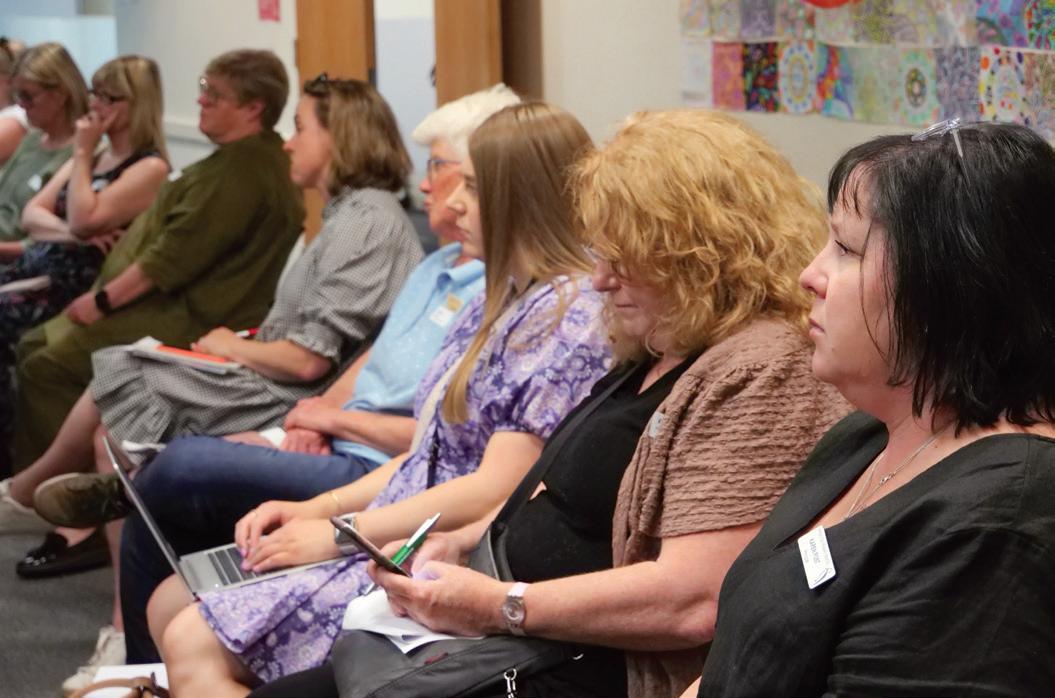
In addition to the matters above, ensuring that country public education is staffed with qualified teachers who are teaching within their qualification is essential. There must be transparent and consistent incentives to attract and retain teachers in country schools. The quality and supply of housing is detrimental to country working conditions, and there needs to be a review into this crisis.
We face a teacher shortage, and we have consulted with members about the best solutions. There is no quick fix, but the bottom line is, if we fail to address the excessive workloads and poor working conditions that South Australian educators currently face, we only exacerbate an escalating crisis for years to come.
AEU members have the solutions. Let’s hope the government is prepared to listen and act.
ANDREW GOHL PRESIDENT, AEU SA
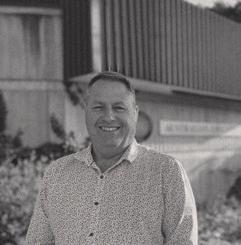
JOIN THE CAMPAIGN TO FIX THE TEACHER SHORTAGE CRISIS.
AEU negotiators will need member support during the campaign on social media, in the community and in sites. We're stronger together!
Visit fixthecrisis.com.au to receive campaign and bargaining updates, as we bargain for a better future.
THANK YOU TO ALL MEMBERS WHO CONTRIBUTED TO THE LANDMARK REPORT. Visit fixthecrisis.com.au to read the full report.
FROM THE PRESIDENT AEU SA Journal | 5
Members and non-members were invited to attend IESP Roundtable.
Onwards and upwards in 2023
AEU Branch Secretary, Leah York reflects on the year that was, the significant wins achieved by our union, and the development of a new strategic plan.
Following another year of challenges for our profession, 2022 has yet again highlighted the inadequate resourcing of South Australia’s public education system. Workloads across our preschools, schools and TAFE campuses are damaging to the wellbeing of our members and the children and students we teach. Educators’ goodwill continues to be exploited.
However, with the year ending, it is important to recap some of the significant wins we have managed to achieve:
+ A new Enterprise Agreement for TAFE Educational Staff –achieving a small salary increase with no trade-offs - maintaining all conditions in the face of government pressure to diminish the professional capacity of lecturers and educational managers.
+ Successful election campaigns at both state and federal levels of government to highlight the funding needs for public education and TAFE.
+ Commissioning the University of South Australia to undertake crucial research into the working conditions of teachers that was launched on 3 November 2022.
+ Working collaboratively with the South Australian Government and the Department for Education to identify onerous systems of bureaucracy that impede teaching and learning outcomes for students. An example was our IESP Roundtable, which highlighted the gruelling and convoluted process teachers need to go through to receive funding for students in need.
We are now in the final year of a three-year strategic plan (2020-2022). This plan called on us to use our industrial and professional strength to achieve, among other things, a well-resourced public education system and improved working conditions for educators. The ongoing global pandemic and significant cost of living increases have presented additional challenges, and understandably members have had to make tough decisions about their employment and their union membership.
As we commence enterprise bargaining for schools and preschools, we are developing our strategic framework for the next three years (2023-2025). We are working through Branch Executive to develop a draft of our priorities for the consideration of Branch Council in March 2023. These include:
ADVOCATING FOR OUR MEMBERS
We ensure that no matter what interaction a member first has, information, support and advocacy are provided in a timely, professional, and consistent manner.
CAMPAIGNING TO WIN
Campaigns that unite us are fundamental to the future success of our union. We build our strength and engage educators who see the union as an effective path forward when seeking reform and change.
BUILDING THE PROFESSIONAL PROFILE OF EDUCATORS
An increasingly hostile media landscape means public education, and by extension, the professional profile of public educators, is under threat. Through coordinated strategies, our strong collective voice is used to highlight the important work of public educators and your value to society.
RECRUITMENT AND RETENTION
As unions around the world work to maintain relevance, we must reimagine and reinvigorate the value we provide to our members. We are responsive to your career journey, inspire action through collective identity, and ensure involvement is easy and accessible. ‣
AEU SA Journal | 6 FROM THE BRANCH SECRETARY
To increase our capacity to campaign effectively we all need to focus on the recruitment of new AEU members and work collectively to achieve outcomes for all public education workers.
BUILDING A STRONG, SUSTAINABLE UNION
Our proud history should be celebrated, even as we look to the future. Together, we stand united in pursuit of fundamental changes to the public education system.
RECONCILIATION AND CULTURAL SENSITIVITY
As the AEU continues on its path towards reconciliation, we ensure the voices of Aboriginal people are heard. We pursue system-level reforms and industrial conditions which facilitate the fair and equitable participation of Aboriginal people in public education.
Only by standing together can we achieve our vision, ‘united as educators, we are a professional union which protects, promotes and enhances an inclusive public education for all South Australians.’ There is too much at stake for us to be divided. If South Australia’s public education workforce is to be given a fair go in 2023, we must find strength in numbers.
If you have any queries, please contact Branch Secretary, Leah York leah.york@aeusa.asn.au or 0417 894 085
Union News
LEAH YORK BRANCH SECRETARY, AEU SA
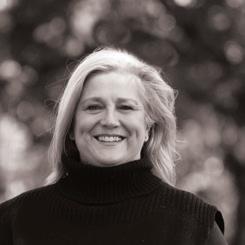
Christmas Closure
The AEU Office will be closed from 12 noon Friday 23 December 2022, re-opening on Monday 9 January 2023.
Merry Christmas to all AEU members, we hope you all have a rejuvenating break.
We value what you have to say
Take our short survey to go in the draw to win 1 of 2 $50 Australia Post Gift Cards by Mastercard®. www.surveymonkey.com/r/aeuaudit

Changing workplaces in 2023?
Notify the AEU Membership team so they can update your details.
membership@aeusa.asn.au
AEU SA Journal | 7 FROM THE BRANCH SECRETARY
Reminder
What lies beneath our campaign to #FixTheCrisis
As we enter negotiations with the Department for Education, AEU Campaign Director, Callum Penley looks at the #FixTheCrisis Campaign beyond enterprise bargaining.
I’m hoping you’ve heard about our campaign to fix the teacher shortage crisis. It sounds simple, and purposely so. Strong campaigns tap into an issue already in the public and media consciousness, and that’s exactly what we’ve done here at the AEU. However, the real campaign is the one which aims to address the systemic issues sitting below the surface.
In early November, we launched the first research of its kind in South Australia, providing an academic dataset to validate the hundreds of anecdotal accounts we’ve heard from educators right across our state. 'Teachers at breaking point ' was a damning indictment on a system in dire need of reform. And for the AEU, it will set the direction for not only enterprise bargaining, but for our campaign efforts into the future.
Sign up to our campaign and encourage your colleagues to do the same.
Visit fixthecrisis.com.au for more information. Talk to your AEU Campaign Organiser to see how you can get involved.
The education system is built on fickle foundations and until we address that, we’ll continue to use our resources campaigning for quick fixes to long-term problems. Having worked in government, I have no doubt the Department for Education shares our commitment to improving public education. But as the largest union for public educators in South Australia it is our job to present those solutions in a way that is strong and organised. To do that, we must be united.
I know what it takes to create a political problem that demands attention, but we need the strength of our profession and the wider community behind us. To win this support, we must not get caught up arguing about minor details when we all agree on the fundamentals. More time for quality teaching, more support for students, and a salary commensurate with the value of your work. We know these are the fundamentals because you told us they are. Now, we must all come together to demand change.
Whatever your opinions of the past, 'Teachers at breaking point ' provides a crucial opportunity for us to stand together and present long-term solutions to an escalating public education crisis. The AEU is committed to being constructive and collaborative because while we know our argument is strong, it relies on all of us. I am proud of our union for leading this conversation and pioneering a path towards a public education system that is truly world class.
To borrow the words of a school principal I spoke with recently, “there is hope, but we need to work together to get there.” Now is the time to build the momentum. This campaign will not end with a new enterprise agreement, but with a system that values educators and supports students.
It sounds simple, and purposely so. Are you with us?
 CALLUM PENLEY CAMPAIGN DIRECTOR, AEU SA
CALLUM PENLEY CAMPAIGN DIRECTOR, AEU SA
FROM THE PRESIDENT FROM THE CAMPAIGN DIRECTOR
The crisis at hand is much bigger than any one industrial instrument can adequately solve.
Teachers at Breaking Point: Why working in South Australian schools is getting tougher
On November 3, the AEU in conjunction with the University of South Australia Centre for Research in Educational and Social Conclusion (CRESI) launched the report, 'Teachers at breaking point'. Professor Emeritus Alan Reid gave an impassioned address at the launch where he looked at the root causes of the current crisis and the need to bring the joy back to the profession. Below is an abridged version of his address.
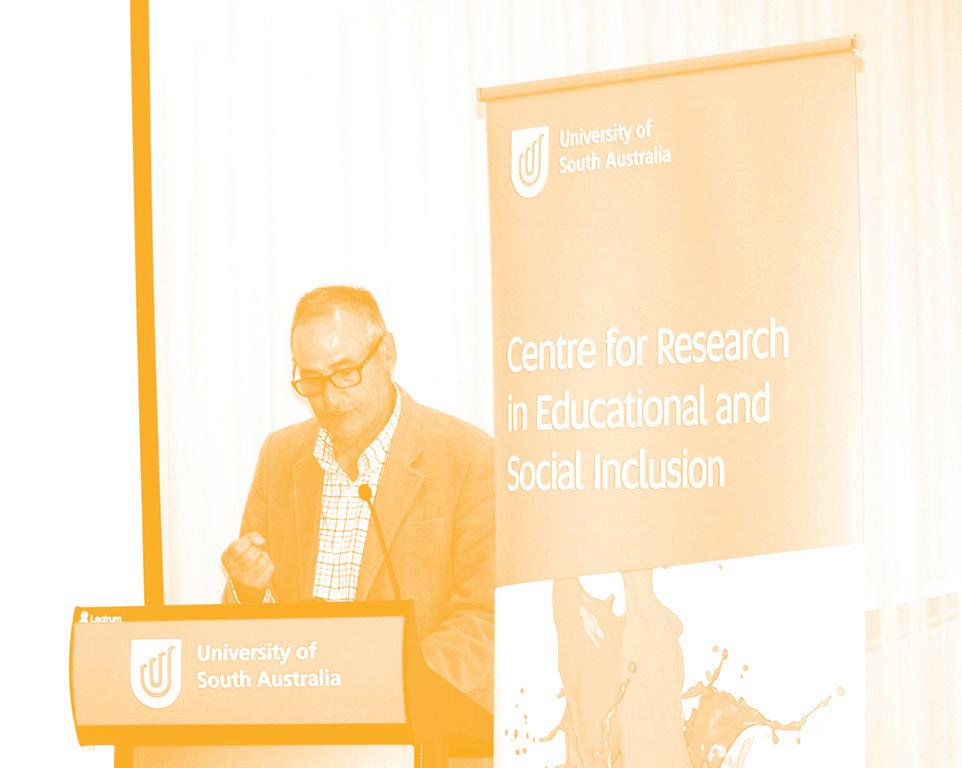
My career in education has gone full circle. When I started teaching in South Australia in the 1970s, public schools were emerging from a time when centralised control of the curriculum, and top-down decisionmaking at school and departmental level dominated. Change was happening because schools were becoming increasingly complex.
Research was showing that the traditional ways in which schools were organised were no longer meeting the needs of a significant group of students. This led to the realisation that the mainstream academic curriculum had to change; and that teachers had to be involved in the design and planning of this new curriculum to ensure it was tailored to meet the diverse learning needs of their students.
The then Director-General of Education, Alby Jones had, through his Freedom and Authority memorandum, given schools and teachers more freedom to exercise their professional judgment. His memorandum did not encourage public schools to compete against each other as the recent flirtation with ‘school autonomy’ has done, but rather gave freedom to teachers to collaborate within and across public schools.
It was based on a firm belief that teachers were professionals with skills and expertise. Since they were closest to the action in classrooms, they were best placed to fashion programs and teaching approaches
that suited the students and their learning contexts. The role of the Department was to provide human and material resources that would support teachers in their professional work.
The next decade was one of intellectual ferment and excitement. Teachers largely grasped the new freedoms with both hands. In the social science faculty at the school in which I was first appointed, we spent hours after school debating, sharing, innovating, evaluating, and planning. We just loved our work, and as demonstrated by the educational outcomes that were achieved, the students lapped it up too.
But then, from the late 1980s, things began to change, at first slowly and imperceptibly and then apace. The result of that thirty-year period is encapsulated in this excellent report which documents how teacher professionalism has been eroded, teachers’ work has been intensified and teaching has been turned from a collaborative endeavour into an individual and competitive one.
Sadly, it seems that education has come full circle. How and why did this happen?
THE RISE OF NEOLIBERALISM
It is no coincidence that things began to change with the rise of neoliberal economic philosophy in the 1980s – a theory that proposes an unregulated free market, reduction in the size and role of government, and taxation cuts to high income earners which would ‘trickle down’ to the rest of us by creating more jobs.
At the heart of neoliberalism lies some particular ways of seeing the world. For example, it encourages us to think of ourselves as consumers exercising ‣
AEU SA Journal | 9 TEACHERS AT BREAKING POINT
Driving home from school one night, I remember thinking that there was no other job that I would want to do. This one had more intellectual stimulation and fun than any other occupation I could imagine.
choice in our own self-interest, rather than as citizens with an interest in the common good. And it establishes the belief that the private sector is best placed to deliver important public programs and infrastructure, so fanning a mistrust of the public service.
However, neoliberalism does not just function as an economic philosophy. Its dominant assumptions and values have invaded all areas of social policy, including education which is seen as being primarily a tool of micro-economic reform with the role of developing ‘human capital’. This dominant economic purpose in turn shapes the strategies and policies through which it is pursued. From the late 1980s it spawned the standardising educational agenda.
In Australia, the standardising agenda has at least two dominant aspects to it. The first involves transferring private sector approaches to education. Before long education departments were awash with vision and mission statements, key performance indicators, strategic plans, and intrusive forms of accountability mechanisms designed to control teachers and schools in order to achieve the KPIs.

Within this instrumentalist logic, the need for educational expertise in policy making was seen as unnecessary, and increasingly public servants without educational backgrounds populated departments of education. When ‘expertise’ was needed, external consultants were commissioned from the private sector, invariably producing outcomes that were already predetermined by their clients.
The second aspect is a focus on competition in education, where parents and students are understood to be consumers making choices in a market. The logics of choice and competition have resulted in several negative consequences, but it is the negative impact on teachers that is the focus of this report.
When parents and students are understood to be consumers, they
need data to assist them in making their choices. Enter standardised testing. Even though NAPLAN and PISA test only a small slice of the curriculum they have become the surrogate arbiters of educational quality. The numbers derived from the test become immutable judgments about the quality of individual schools and education systems.
For example, in South Australia in 2017, McKinsey, an external consultancy company, was engaged to tell the system how to achieve ‘world class’ status over the next ten years. They mixed the South Australian NAPLAN and PISA scores from the previous few years and arrived at the number 482, claiming that we needed to get to 530 to be considered world class. The complexity involved in such work as understanding educational purposes and assessing educational outcomes and progress across the formal and informal curriculum was ignored in favor of boiling that all down into a single number.
The datafication of education has been widely critiqued and I am not going to reprise those arguments. But it is important to recognise what accompanies this testing regime. Education systems are very sensitive to any shift in position on the league tables that are published on the basis of the test results, and to the public opprobrium that follows any decline in scores or ranking. The response has been to introduce accountability regimes designed to improve test results by setting targets, rewarding success and punishing failure. If improved test results do not follow, the ‘improvement’ strategies are ratcheted up. Slowly, improving standardised test results becomes the raison d’etre of education.
The combined effects of the standardising agenda are captured comprehensively in this report and are consistent with similar reports in other states and territories:
+ Teachers are subjected to increased administrative demands and paperwork associated with the accountability requirements and the intrusive top-down initiatives that rain down upon them.
+ Work intensification leads to rising rates of teacher stress, burn-out, cynicism, disillusionment and resignations.
+ Teachers’ work is deprofessionalised as ‘experts’ from outside the school establish the goals of schooling, the specific policy interventions to achieve them and the ways to assess them, while school-based educators are charged with the task of implementing it all, and are held responsible for the outcomes.
+ Teacher morale plummets as their professional expertise is undervalued, as they are excluded from making important decisions about their work, and as they are subject to ongoing criticism about their work based on the simplistic measures described earlier.
The irony is that since the introduction of the standardising agenda, our test scores have been declining. And yet, every time there is an outcry about the results, rather than questioning the direction of education policy, policy makers simply double down on the agenda! ‣
AEU SA Journal | 10 TEACHERS AT BREAKING POINT
Everyone seems to have a strategy to fix the decline – performance pay, charter schools, more testing, copying the strategies of the ‘successful’ countries, and so on, all with one common element: teachers are blamed.
This then justifies even more interventionist approaches and so the misery is increased – further lowering morale. During all of this the standardising agenda itself is never questioned, despite its manifest failures as judged by its own measures!
There must be another way.
WHAT CAN BE DONE?
I can see light at the end of tunnel. Neoliberal economic theory has been discredited by leading economists for some time, and that skepticism is now mainstream. The philosophy of ‘trickle down’ economics is on its last legs.
The task is now to challenge the logic of neoliberalism in the social and cultural spheres, and education is an important part of that. As education becomes ever more complex, a new educational narrative is needed –one that rejects the standardising agenda and that restores teacher professionalism. This report provides the hard evidence to justify such a policy turn.
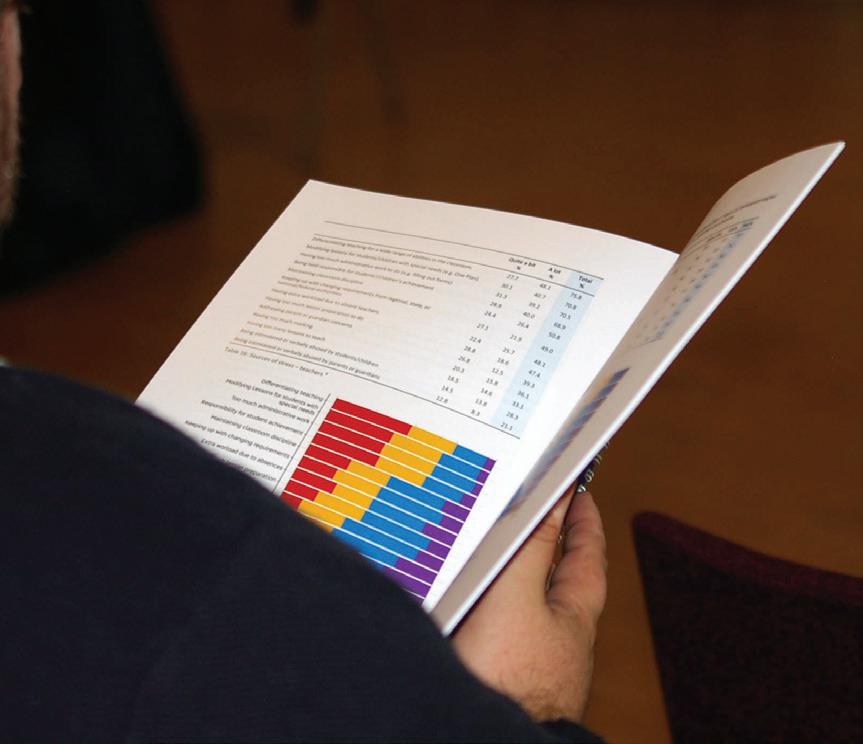
If we are serious about achieving high quality educational outcomes for all, then we must give teachers back their professional voice and provide them with the resources they need to engage in collaborative curriculum work. In short, we must return to teachers the joy, the intellectual stimulation, the zest, and the fun that should be at the heart of a career in education.
PROFESSOR ALAN REID EMERITUS PROFESSOR UNISA EDUCATION FUTURES
Every workplace deserves a committed SubBranch Secretary
In June 2022 our then Sub-Branch Secretary (SBS) won a position at another school. Following this, I was delighted to be nominated and appointed to the role at Mitcham Girls High School (MGHS).
With over 20 years’ experience in both teaching and leadership positions I felt I had a great deal to offer. I have always been an active member of the AEU and am forever grateful to the organisation for their continual support. Not only in a personal sense, but also via the incredible work we engage in to ensure public educators are given a fair go.
My focus at MGHS centres around the support of both staff and student outcomes. I have taken on this role passionately and recognise the importance of being the local representative of our union. I want to listen, advise, seek solutions, and be an advocate for our members.
My SBS training began with a comprehensive 2-day workshop run by the AEU Education Director. The knowledge and confidence I took away from this session has enabled me to give reliable support to our members. Returning to school I began the process of creating a Workplace Organising Committee (WOC), as well as organising a well-attended sub-branch meeting with guest speaker, Andrew Gohl, AEU Branch President.
The news of our principal resigning has also created an opportunity for me to be the AEU representative on the upcoming panel. It is both a privilege and honour to be a part of this process. To ensure I execute my duties effectively I have attended four merit selection training sessions and have complemented this training with individual mentoring. In addition, I have also sought information from our members regarding the qualities and characteristics deemed to be vital for any successful candidate, which I have passed on to our Education Director.
Of course, all this work is supported by the AEU Organiser for Mitcham, whose active encouragement enables me to perform my role with knowledge, skill, passion, and energy.
It is so important to be proactive as an SBS, as it requires a lot of energy. And there is a challenge now to get our site to recognise the need for release time for the SBS, Personnel Advisory Committee (PAC) and Work, Health and Safety (WHS) representatives. I have met with our acting principal to ask for consideration to formalise release time for these activities and have explained that this is an industrial entitlement. A further meeting of our sub-branch has passed a motion to formalise this request.
SUB-BRANCH SECRETARIES & REPS
‣
Gaye Rose, Sub-Branch Secretary (SBS) at Mitcham Girls High School, reflects on her time in the role, as well as the need for schools to release time for members to engage in union business.
TURN OVER FOR A PULL OUT POSTER →
There is a real buzz in the staff room now, as word is spreading about the value and importance of joining the union movement. With regular meetings planned, an increase in site membership, and greater transparency from our PAC and WHS representatives, momentum is building.
I am confident that our sub-branch will go from strength to strength. Growing our membership has never been more important. With increased workload pressures placed on teachers, and admin time on the rise, our members demand to be heard. Online meetings do not adequately allow for the robust discussion of the issues our members feel strongly about. At our last sub-branch meeting we passed a motion to have meetings face-to-face, and that they include an opportunity for staff to raise issues for discussion.
Despite the considerable pressures facing public educators across the state, I am rejuvenated by the prospects of a new round of enterprise bargaining.
Your Union needs you!
I have an abundance of hope for a better future. It’s time to 'Fix the Crisis', particularly considering the independent data recently published by UniSA. This powerful research shines a massive spotlight on the unsustainable workloads currently plaguing our profession. Teachers are at breaking point. Let's do something about it.
SUB-BRANCH
AEU SA Journal | 12
GAYE ROSE
SECRETARY, MITCHAM GIRLS HIGH SCHOOL
aeusa
Authorised by Leah York, Branch Secretary, Australian Education Union (SA Branch), Kaurna Country, 163 Greenhill Road, Parkside SA 5063.
www.aeusa.asn.au
aeunionsa aeusa
What a journey it has been so far! In just 4 months so much has happened.
PULL ME OUT & PIN ME UP ON YOUR AEU NOTICEBOARD
I find it difficult to adequately describe the incredible support I have and continue to receive from the AEU so that I can effectively perform my role.
Election time for Sub-Branch Secretaries and Representatives
It's time to elect your new AEU Sub-Branch and preschool group leaders for 2023!
A big congratulations to all AEU Sub-Branch Secretaries and Representatives in our schools and preschools. What a year! The work you do is critical to building the strength of our union.
The bigger and stronger our subbranches are – the more positive change we can create for our members, and the children and students we work with.
As we approach the end of the year, it’s time for members to start thinking about the leadership of their sub-branch or preschool member group for 2023. AEU rules require that you hold a sub-branch AGM each year prior to 18 February in order to appoint your local union leadership. Many do so in week zero, but you’ll know what’s best for your site.
Support for new and continuing representatives will be offered as always, with training and opportunities such as the SubBranch Secretary and Workplace Representatives Huddle available again in 2023.
WHAT YOU NEED TO KNOW:
1. Your sub-branch AGM must be held prior to Saturday 18 February 2023 in order to appoint your local union leadership.
2. You can reach out to the AEU Information Unit for advice and support surrounding elections.
3. Elected representation will have access to support including training, events and networking.
Once you’ve completed your AEU elections, please let our head office know the results.
Keep an eye on your email in January for calls for nominations for 2023 delegates to Branch Council and TAFE Division Council.
Contact the AEU Information Unit for advice about AEU elections on (08) 8172 6300
Find out more at aeusa.asn.au/elections
AEU SA Journal | 13 SUB-BRANCH SECRETARIES & REPS
Improving Country Conditions
I wish there were a straightforward way to help people understand the unique challenges that our country educators face day in and day out. Country schools and preschools have been under the pump for a long time.
The staffing crisis in the city becomes even worse as you travel out into rural, regional, and remote SA. Country educators comprise a significant and important sector of our membership. This term, the Country Conditions Standing Committee has been working with the Department for Education to identify and design effective strategies to attract and retain staff in country schools.
The Committee has met with the officers leading the Department's Country Education Strategy and has responded to their Country Incentives Review to ensure our government is able to appropriately provide for its
AEU Vice President, Matthew Cherry looks at ways the Department for Education can improve its Country Incentives Scheme and help address the teacher shortage crisis in regional South Australia.
the Department must avoid situations like this in the future.
IT MUST ENSURE IT EFFECTIVELY UTILISES ITS COUNTRY MENTORING PROGRAM AND, IDEALLY, EXPAND IT.
The Department has a fully funded mentor program. However, many country educators are not aware of it. Country staff need to be informed about programs such as these. Also, these programs need to be expanded to ensure mentors are not under excessive workload pressures, and that mentees receive support too.
IT MUST SIGNIFICANTLY INCREASE THE TOTAL NUMBER OF PRIMARY TEACHERS (PRTS) IN THE SYSTEM AND MAKE THOSE POSITIONS ONGOING.
PRTs are a vital component of our country workforce. They offer
not overworked or overburdened with other 'duties,' and that schools are staffed on a calculation that is appropriate for a country context.
THE DEPARTMENT MUST IMPROVE PRESCHOOL CONDITIONS IN THE COUNTRY.
There is too much uncertainty for preschool educators in the country. The Committee understands this and has proposed increased permanence, more fulltime positions, and the development of a strategy to ensure consistency and certainty in funding.
IT MUST REDUCE THE BURDEN OF DISTANCE.
This is easier said than done. However, the Committee has a range of ideas it believes can help better manage the needs of country educators when it is comes to navigating the burden of travel. For example, the Committee explains that
country workforce. The Committee outlined some key proposals that would make a genuine difference in the attraction and retention of country educators.
THE COUNTRY INCENTIVES SCHEME MUST ENSURE EQUITY, BE DELIVERED TRANSPARENTLY, AND MINIMISE CONFLICT AMONG STAFF AT THE LOCAL LEVEL.
The Department's use of these funds has resulted in significant frustration among country staff. They simply did not understand how or why decisions were made about the special incentives some educators received. Fairness and equity are important in building a positive culture. We believe
consistency. They are highly skilled, knowledgeable, and adaptable. PRTs can help address the workload issues presented by the uncertainty of relief lessons. This sector of the workforce can positively impact the day-today operations for country staff. Importantly, we need a pool of Early Childhood trained PRTs.
IT MUST IMPROVE WORKING CONDITIONS AND WORKLOAD IN COUNTRY REGIONS.
Smaller budgets mean less staff. Using staffing calculations derived from metropolitan schools to staff country schools is not going to work. The Committee presented the Department with suggestions to help ensure country educators are
establishing a new type of travel leave for country educators would help attract and retain staff. This special leave would be accessible to regional educators to help them with travel to and from the city for needs such as family engagements and doctors’ appointments.
IT MUST ADDRESS THE HOUSING SHORTAGE.
If you are a country educator, you probably know how difficult it is to secure stable housing outside of the city. The Committee spent a significant amount of time discussing this issue and offering suggestions that can help address this key problem. We know that housing is integral to helping staff members
AEU SA Journal | 14 FROM THE VICE PRESIDENT
We know that housing is integral to helping staff members establish themselves in a community. The Department must work with other Government agencies to enact measures to address this pressing need.
‣
establish themselves in a community. The Department must work with other Government agencies to enact measures to address this pressing need.
The Committee invited the Department to meet for a wide-ranging discussion about its views on country incentives. We hope to have a productive discussion with their key decision-makers to address the issues presented in these broad headings. Rest assured that the members of your Country Conditions Standing Committee are committed to representing your needs, which will directly benefit your students, their families, and your wider communities.
MATTHEW CHERRY VICE PRESIDENT, AEU SA
Your insights and experience will always be welcome on AEU Committees. Visit aeusa.asn.au/committees for more information.
FROM THE VICE PRESIDENT
Successful conversion to permanency actions

Earlier this year we launched a series of Conversion to Permanency actions for teachers and support staff. The sub-branch actions for teachers kicked off in term 2 to coincide with the Department for Education’s recruitment and selection timelines. Actions for SSOs and ECWs followed during Support Staff Week, which ran from August 22-26.
Over 200 sub-branch secretaries and representatives responded to our survey regarding the effectiveness of the actions and reported the following successes:
+ 31% reported conversions to permanency at their sites + 55% had new members join to be part of the actions + 80% reported satisfaction with the AEU’s communication and the support resources provided
Recent data shows that 470 teachers have been converted to permanency as part of this current cycle – more than double that of last year. We are yet to receive any data on the conversion successes of SSOs or ECWs but we should have it by the end of the year. Many eligible members weren’t converted due to a lack of permanent vacancies at their sites.
We continue to advocate for changes that will see improved job security for our members. Across all classifications we’re challenging the department to take a more systemic approach to conversions, so those of you who are eligible are given a fair go.
Congratulations to everyone who participated. Whether you sought conversion. Encouraged and supported others to do so, recruited new members, or managed the process at your site as a leader or Personnel Advisory Committee (PAC) representative, you’ve played an important role. Increasing secure employment for teachers and support staff across South Australia is vital business.
JAN MURPHY VICE PRESIDENT,
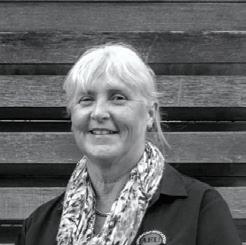
AEU SA
Term 2 saw the AEU encourage Conversion to Permanency actions across South Australia, Jan Murphy, Branch Vice President outlines the major successes of our campaign.
UNION WIN
AEU SA Journal | 15
Find out more
Conversion
about the
to Permanency campaign at aeusa.asn.au/permanency
+70 sites HAD MEMBERS CONVERT TO PERMANENCY 80% of SBS SAID AEU RESOURCES PROVIDED WHAT WAS NEEDED 55% OF SITES recruited new members
You called for action! The AEU Special Education Consultative Committee delivered
In early November, the Special Education Consultative Committee hosted a roundtable with the Department for Education and the Minister for Education, to discuss the Inclusive Education Support program (IESP) funding process.
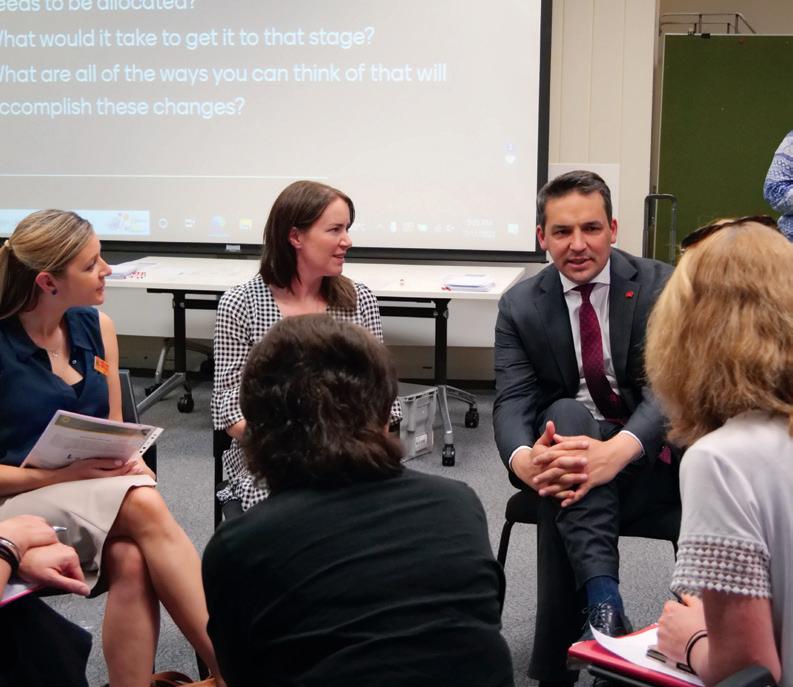
The IESP Roundtable discussions with Chief Executive, Martin Westwell and Minister for Education, Blair Boyer gave attendees a valuable forum to voice their concerns with the program. The feeling in the room was collaborative with all parties maintaining a solution-focused approach to the discussions.
“Recognise and trust the expertise and experience of teachers and leaders at the individual sites… because the funding they are seeking is genuine and they are competent, effective practitioners.”
checks and balances. There was a sense of pragmatism, though, with the understanding that there does need to be some degree of verification.
The current system, however, is failing. The administration requirements of the system are too much. Attendees are calling for a reduction of the administrative burden by streamlining the application process and developing better IT infrastructure that would allow reporting and verification systems to work cohesively.
There are also some calls for educators from the Department to visit sites to better understand the contexts that inform views and concerns of the educators.
WHAT SHOULD IMMEDIATELY BE DONE?
There aren’t many quick fixes to the current system. Training and development, revisions to assessment criteria, and reworking the application process can take time. Therefore, attendees called for further rollovers of current funding and, again, a dramatic shift toward trusting the educators.
It is also clear that the system needs to be more personable, where those making decisions about funding requests liaise with the educators.
A CLEAR PATH FORWARD.
We know that both the Department and the Minister heard your concerns. Now, the Committee is focused on continuing these conversations via a more formal meeting with the Chief Executive. This meeting will allow the Committee to present the solutions you proposed and initiate the necessary change process to ensure children can access the supports they need.
WHAT ARE THE LONG-TERM SOLUTIONS?
Participants at the round table clearly articulated their goals for the IESP process: educators, with their deep knowledge and professional judgement, need to be valued when making assessments about the needs of their students.
The most common solutions called for more autonomy and more reliance on the judgement of the educator without overzealous
We are a union of, and for, educators. Due to the efforts of the Special Education Consultative Committee, we are now on a clear path toward improvement, working collaboratively with the Department and the Minister to address fundamental flaws in a system that disadvantages educators and their students.
Later this term, we hope to meet again with Martin Westwell to continue to advocate for change. During this discussion we promise to present a suite of solutions, some of which can be actioned immediately, and others with more long-term impact. We vow to work with the Department to strengthen our collaborative relationship in a bid to prevent issues like this from arising in the future.
According to attendees, in the current IESP system
Families understand the processes
The level of accountability is right
My professional autonomy is valued
Moderately Moderately
We are proud to be playing this important role, bringing together educators and decision-makers to ensure the best outcomes for our students. Now we need you to stand with us as we bargain for a better future. Visit: fixthecrisis.com.au
AEU SA Journal | 16 LEADERS FOCUS
“Educators want their students to thrive. The system, as it currently works, impedes that for too many.”
No No No Yes Yes Yes Moderately
TAFE Symposium
As part of the development of a TAFE SA Roadmap for the Future, the AEU hosted a symposium at the Regency TAFE Campus. Angela Dean, Campaign Organiser (TAFE Focus) reflects on a day that brought government, industry, community and unions together to discuss where we want TAFE to be in ten years.
Our Future of TAFE Symposium was held in mid-October, and investigated the role of TAFE in meeting the vocational education and training (VET) needs of South Australians over the next decade. At the event we heard from a variety of guest speakers highlighting the economic, social and community benefits of a high quality, publicly funded TAFE system.
with TAFE SA using an on-site traineeship model. The presentation also outlined Matt’s thoughts on how great communication, clarity, and scheduling were key to these effective industry partnerships. Also highlighting how TAFE SA is a trusted training provider and has ongoing positive brand association with industry.
Another keynote speaker, Human Rights Activist and former Socceroo, Craig Foster AM, gave a fantastic presentation on the social responsibility of education providers like TAFE SA. In Craig’s address, he clearly outlined the important role education plays in shaping the type of communities we want to live in. Specifically noting how educating the ‘whole’ human, not just the academic parts of us, but also the cultural and humane elements, enriches our society. Additionally, Craig also highlighted the commitment all public education institutes should have regarding diversity, inclusion, and global citizenship. Despite the international standing of the symposium’s keynotes, the most impactful statements of the day came from former TAFE SA students, Lynda Gibson and Gaynor Bowers. Both women shared impactful stories of how studying at TAFE transformed their lives. With Lynda specifically noting, “I was a real person again” following her studies in the Women’s Education Program at TAFE SA.
One of our keynote speakers, Economist and Director of the Centre of Future Work, Dr Jim Stanford, spoke about how TAFE has been the trusted provider of quality, stable, and accessible vocational education across Australia for decades. In his presentation, Dr Stanford also provided an overview of how the privatisation of the VET sector has been a disastrous failure. The key point Jim delivered was how governments across Australia should look to rebuild our economy post COVID with an ongoing commitment to properly funding the public VET system.
A TAFE SA Industry Partner, Matt Kowald from Barossa Village, spoke about their success working in collaboration
We also heard from Minister for Education, Training and Skills, Blair Boyer MP who spoke about the value TAFE provides to the South Australian economy and laid out his Government’s approach to the upcoming review of TAFE SA, which will inform the development of a Roadmap for the Future of TAFE SA.
The overarching message from the event was that TAFE SA is perfectly positioned to help South Australia rebuild, stimulate the economy, and address serious skill shortages. But it urgently needs guaranteed funding from the South Australian Government to do so.
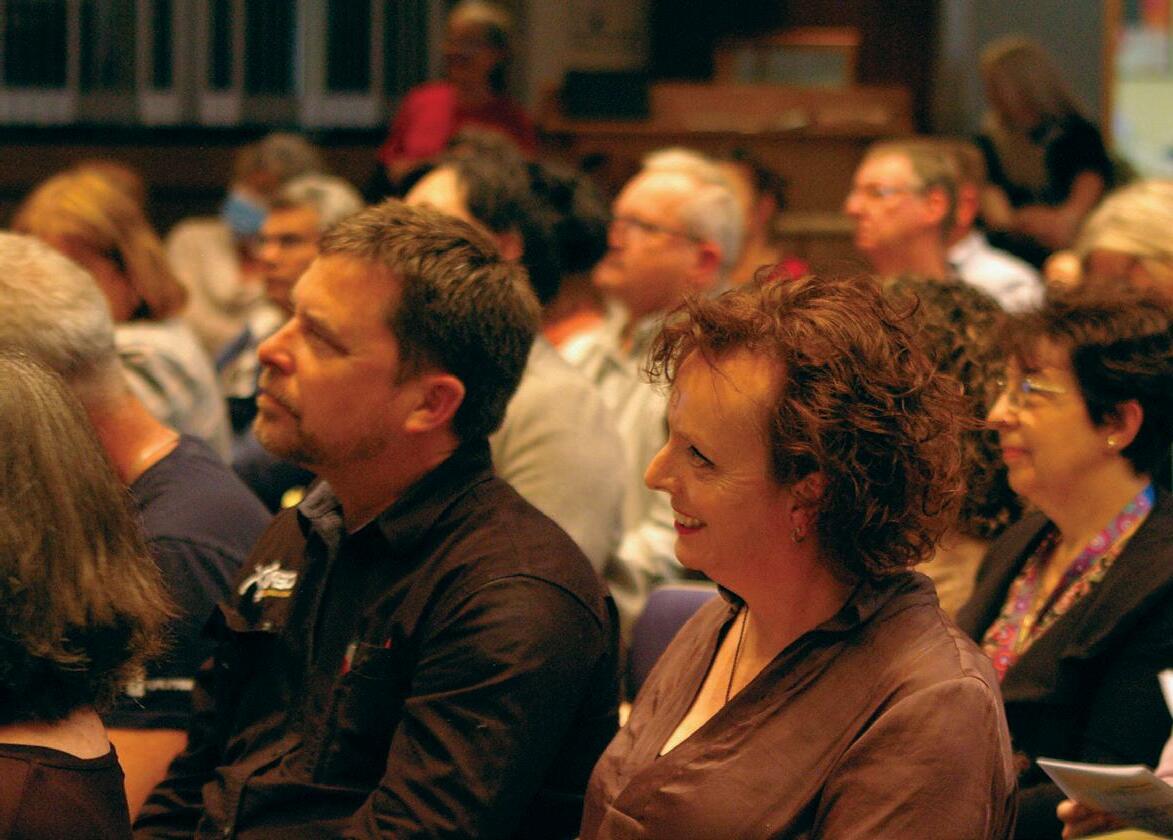 DEAN CAMPAIGN ORGANISER
DEAN CAMPAIGN ORGANISER
FROM THE PRESIDENT AEU SA Journal | 17 TAFE FOCUS
FOR THE FUTURE →
ANGELA
(TAFE FOCUS), AEU SA
TAFE SA ROADMAP
Without a clear commitment from the State Government to guarantee at least 70% of all VET funding to TAFE, they cannot deliver their commitment of a stronger TAFE system for South Australia.
TAFE SA Roadmap for the future
As outlined by Hon Blair Boyer at our TAFE symposium, the South Australian Government has committed to a review of the sector with a focus to providing a TAFE SA Roadmap for the Future.
The key areas of attention for the roadmap are: providing quality training, enabling social mobility and participation for all cohorts, valuing the TAFE SA workforce, supporting industry and employers, meeting regional needs, and ensuring good governance.
The review will be led by Associate Professor Jeannie Rea of Victoria University, who will oversee the development of the roadmap and prepare a report for the Minister for Education, Training and Skills. This report will make recommendations on the role of TAFE SA, as the public provider of skills training within the broader education and training system.
Associate Professor Rea’s recommendations will take a long-term focus looking at the next decade and beyond. This will include opportunities, risks and barriers that must be addressed to ensure that TAFE SA is able to operate efficiently and effectively.
Associate Professor Rea will draw on the advice and expertise of an Expert Advisory Panel, including a
BRAIN BREAKS
Brain Breaks
representative from the AEU, TAFE Divisional Council, Chairperson, Rebacca Brooks. Any recommendations that are identified because of this work will be funded internally and will inform the Ministerial Charter for TAFE SA.
There will be an extensive consultation process where stakeholders and the community will have the opportunity to provide input into the roadmap. This will be facilitated through, targeted roundtables, consultations with priority cohorts, public consultation, and an online government survey. Consultation started in October 2022 with the report expected to be finalised by April 2023.
As part of this review process, it's important we hear from our members about your vision for TAFE in South Australia. We are asking members to visit our Future of TAFE campaign page on the AEU SA Branch website to have your say. All feedback provided to the AEU will be utilised in our TAFE Review submission.
Have your say on the TAFE Review at futureoftafe.aeusa.asn.au/vision
Quick breaks that help refocus and return to work feeling centered.
Find the word in the puzzle.

Words can go in any direction - up, down, diagonal, backwards and forwards. Words can share letters as they cross over each other.
Celebrate with a silent cheer
This activity is perfect for the end of an activity or a sustained amount of work time. Stand up and silently cheer and gesture in celebration.
wellbeing educators bargaining members
join salary advocating sustainable
win breaking sbs community
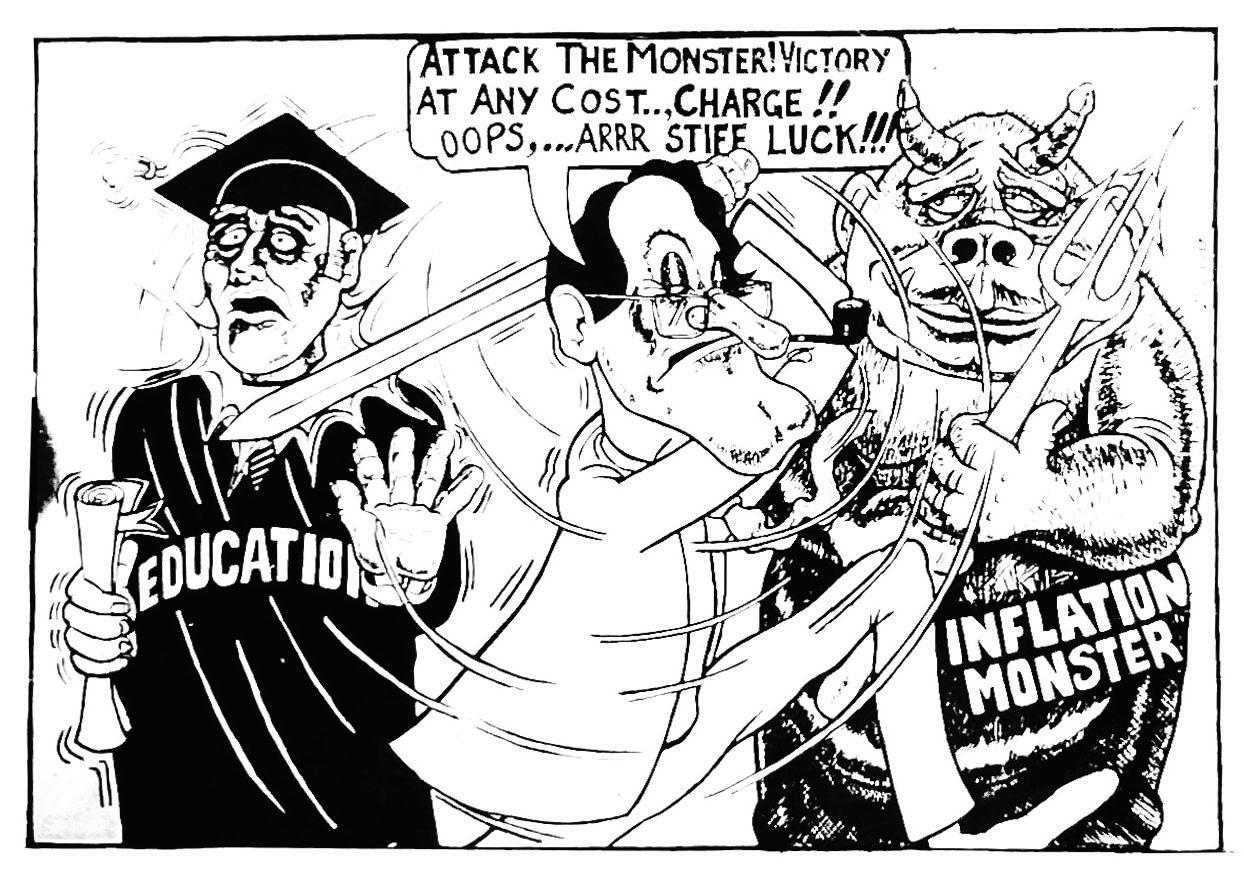

From 30 years ago, a cartoon for union publications from Bill Cook, artist and Vice President.
Answers: Scan the QR Code to see the answers.
AEU SA Journal | 18
TAFE FOCUS TAFE SA ROADMAP FOR THE FUTURE →
Wellbeing [for workers] in the holidays and beyond
It’s not news that student wellbeing is fundamental to successful engagement and achievement. Speaking about wellbeing for adults, though, is somewhat trickier, conjuring images of Byron Bay naturopaths and green smoothies. But wellbeing is important.
Wellbeing for workers isn’t just about rest, meditation, and yoga. Professional recognition, relationships, participation, and respect all play a part. And maintaining your wellbeing at work is not only your responsibility. Under Work Health and Safety law your employer also has responsibility for your welfare and wellbeing as a worker.
Since your wellbeing at work affects how you feel outside work, this responsibility extends to your mental health outside of the workplace, times when you are away from the site. Like weekends and holidays, which are thankfully fast approaching.
Staff wellbeing is a topical issue, currently on most workplaces’ radars. However, it’s hard to see what’s being done about it within educational settings. For example, has anyone read the Department for Education’s Employee Metal Health and Wellbeing Procedure? Probably not.
This procedure lists workplace psychological hazards, which are common in education sites and must be controlled (but mostly aren’t) under the Work Health and Safety Act. This is far from adequate.
How about the school staff who were required to stay back until 5pm for wellbeing workshops! Wellness box ticked. Yet, activities like this often leave staff furious. Wellbeing at work isn’t something that exists in isolation to the rest of your life, it is your life. It’s informed and influenced by everything that happens at work.
Here are steps you can take to help you look after your wellbeing when you return to work:
+ Commit to being involved in the 2023 enterprise bargaining campaign.
+ Know your rights via the enterprise agreements.
+ Read the Department's Employee Metal Health and Wellbeing Procedure to find the psychological hazards, including excess workload, that our employers should be controlling.
+ List by priority what needs to change to improve your wellbeing. How many of your colleagues would feel the same?
+ Discuss wellbeing with your colleagues in week zero and devise a 2023 wellbeing action plan.
+ Arrange to elect a union representative and think about putting your hand up to help. Make sure you have a Health and Safety Representative (HSR).
The upcoming year is the ideal time to work with fellow members to hold our employers to account for our wellbeing. After all, doing it together is so much more effective and rewarding than going on your own.
JILL CAVANOUGH INDUSTRIAL ORGANISER, AEU SA
The AEU Information Unit provides members with advice on questions of pay, leave and general working conditions.
The Information Unit is staffed:
Monday: 8.15am - 5pm
Tuesday to Friday: 10.30am - 5pm
For advice and assistance please phone 8172 6300 or email info@aeusa.asn.au
FROM THE PRESIDENT AEU SA Journal | 19 OCCUPATIONAL HEALTH & SAFETY
can contact the AEU Information Unit, 8172
or
for advice about their rights at work Staff wellbeing is a topical issue, currently on most workplaces’ radars. However, it’s hard to see what’s being done about it within educational settings. Get Information & advice from the Information Unit
Jill Cavanough, Industrial Officer at the AEU discusses the importance of wellbeing both inside and outside the classroom.
Members
6300
info@aeusa.asn.au
Celebrating 10 years of Pride at the AEU
Diverse-City was the perfect place to celebrate the 10-year anniversary of the AEU LGBTI Consultative Committee.
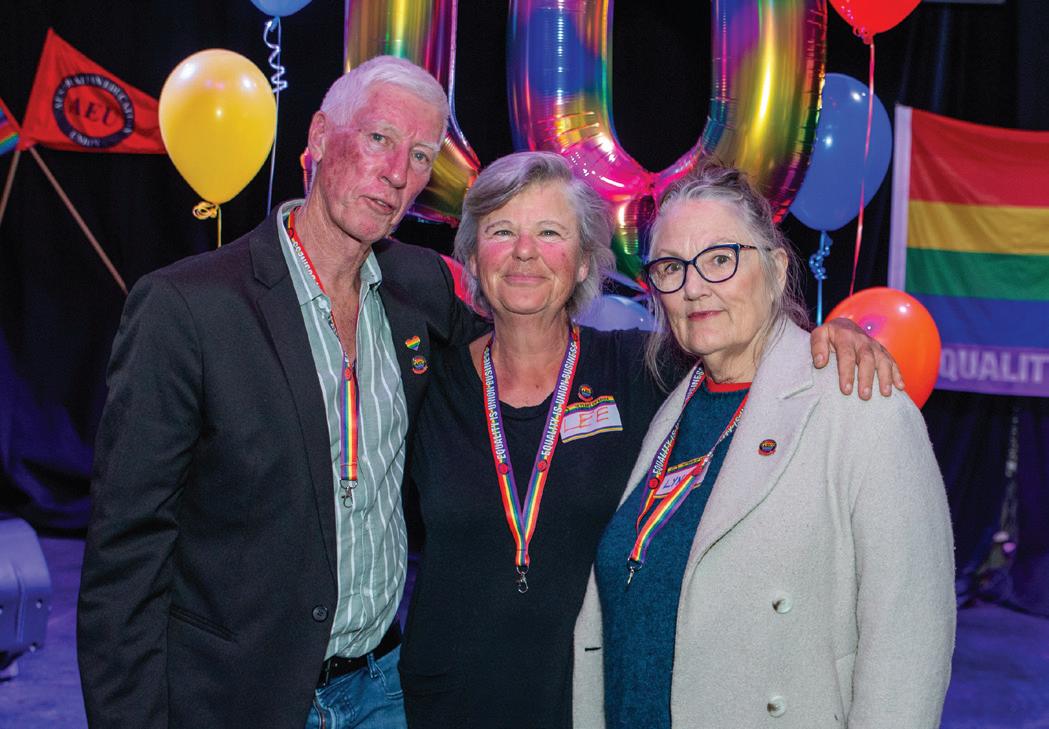
The event celebrated our achievements and presented life membership to the AEU (SA Branch) to Lynn Hall. Among other significant contributions to public education and the AEU, Lynn was instrumental in establishing the LGBTI Consultative Committee. While Alex Brindal, another long-standing committee member, spoke about the historical context in which the committee was founded, the tactics used by the group to support diversity, and the future ahead.
The following is an excerpt from Alex Brindal’s address:
Since the founding of this LGBTI committee (and any other letter combinations we’ve had since then) in 2012, we’ve agitated, demonstrated, and elevated the rights and conditions for LGBTI education staff. While that is always our focus, many of the actions and other work of this committee has resulted in gains for students, families, and Australians more broadly.
So, with this is mind, I’m going to take a moment to summarise some of the achievements of our committee.
a cisgendered opposite sex couples was still a bitter dream following the Marriage Act change of 2004.
So, with all these challenges glacially changing for our community from 2012, supporting diverse educators, has been an important grass roots movement which has led to real-world change. Sometimes this support took the form of educating others through workshops for Safe Schools for All, sometimes it meant establishing Gender-Sexuality Alliances (GSA’s), and in other instances we looked to provide inclusion based professional development training to staff and decision-making bodies. And sometimes, it was all about smaller one-on-one interactions designed to make community connections via festival stalls.
While 10 years might not feel like a long to some of you, let’s consider some historical context and remind ourselves how important our efforts have been. In the decade leading up to 2012, we had a slow wave of change sweep through Australia with the removal of gay panic defence laws, equalising the age of consent for all sexualities, and the beginnings of same-sex relationship and family recognition by the government. Yet in 2012, the Discrimination Act hadn’t been changed to include diverse gender identities or sexualities. And marriage outside of
We’ve done many different things over the years to keep ourselves visible, both within and beyond the education community – we’ve participated in pride marches, marriage equality demonstrations, safe school rallies, and distributed LGBTI merchandise (honestly, you should all have a few lanyards by now). We’ve featured in research studies, forums, and working groups – and had representation at the Federal Women’s Conference and caucus, the AEU Federal Conference and caucus, the FEAST Community Education Forum, the Safe Schools Anti Bullying Initiative Advisory Group, and the AEU Federal LGBTI Working Party.
When we couldn’t be the face of our community, we’ve encouraged schools to celebrate Wear It Purple and IDAHOBIT and we even got the Department to adopt the celebration of these days; and now, we also have TAFE participating too. We’ve updated forms and policies to make diversity present, such as on the AEU membership forms and databases and the AEU federal review of policy; and worked with a ‘musical chairs’ selection of Department officers on resources and policies to audit our industrial instruments to include language like gender identity.
Yet despite all of this, perhaps the most significant achievement of our incredible committee has been the building of our LGBTI+ educators’ network – we’ve had
AEU SA Journal | 20 LGBTICC 10-YEAR CELEBRATION
Our LGBTI Consultative Committee commemorated its 10-year anniversary in Term 3. Alex Brindal, a long time and highly active AEU member gave a spirited address at the celebrations reflecting on the committee’s history and achievements.
While we all know how important education is, we’re also aware that without purpose and meaning it often falls short. So, an important role of our committee has been presence –making our diversity visible for all to see, giving the numbers and guidelines a face.
members from all walks of life. Some are staff and students looking for a supportive education community, some are battling in a remote and challenging education setting, and some are exploring their identity while trying to navigate it as a professional.
I haven’t always been a teacher, my parents were teachers, but I chose not to become a teacher straight out of school because I knew in the early 2000s that it wouldn’t be safe for me to be openly ‘out’ as a teacher, and I knew that I wasn’t going back in the closet. So, as a later-inlife-educator, I want to thank all those who’ve made this committee and community possible. IF IT HAD NOT BEEN FOR ALL YOUR HARD WORK, EDUCATION WOULDN’T HAVE BEEN SAFE ENOUGH FOR ME TO ENTER. SO, I THINK WE ALL DESERVE A BIG CLAP!
In conclusion, I’d like to say, that as far as we’ve come there’s still plenty more that needs to be done. We must continue to fight to make our workplaces safe so that staff are free to be themselves, rather than who they feel they need to be to fit in. One of the major changes we’re working on is increasing visibility in the Department and TAFE through consultation on Diversity and Inclusion Strategies, as well as holding these institutions to account for those plans. We also need to keep pushing for more training to be required for Department and TAFE staff to ensure we reduce the gap between well supported diverse staff and those left out in the sticks.
There are a few things you can do right now. Firstly, remind those around you they can be a part of this committee. Secondly, join our Facebook group! Thirdly, start your own GSA… and finally, spread the word.
The fight ahead for Voice, Treaty, Truth
The October school holidays saw the Annual Aboriginal Members Conference take place at AEU HQ in Parkside. AEU Campaign Organiser (Aboriginal Focus), Michele Appleton was there soaking up all the energy and passion from this valuable event.
Aboriginal teachers and educators (including School Services Officers, Early Childhood Workers and Aboriginal Community Education Officers among others) from across the state came together for two epic days of community building, networking, and knowledge sharing at the AEU Annual Aboriginal Members Conference.
The opening day featured an impressive line up of speakers, including Andrew Gohl, AEU SA Branch President, Al Fricker, Indigenous Education Lecturer at Deakin University, Dyonne Anderson, President of the National Aboriginal and Torres Strait Islander Principals Association (NATSIPA), and Corey Tutt OAM, Founder of Deadly Science. There were lots of new lessons gained from these presentations, and some very insightful questions asked by our members.
On the second day, what a privilege it was to hear from Griefologist, Aunty Rosemary Wanganeen. A qualified educator, assessor, program designer and facilitator, loss and grief counselor, public speaker and published author, Aunty Rosemary gave us the privilege of taking us through her 7-step grief program. There was so much to explore following her address, and I’m sure members look forward to working with Aunty Rosemary again in the not too distant future.
To find out more about the AEU’s Branch Committees, including the LGBTI Consultative Committee visit aeusa.asn.au/committees.
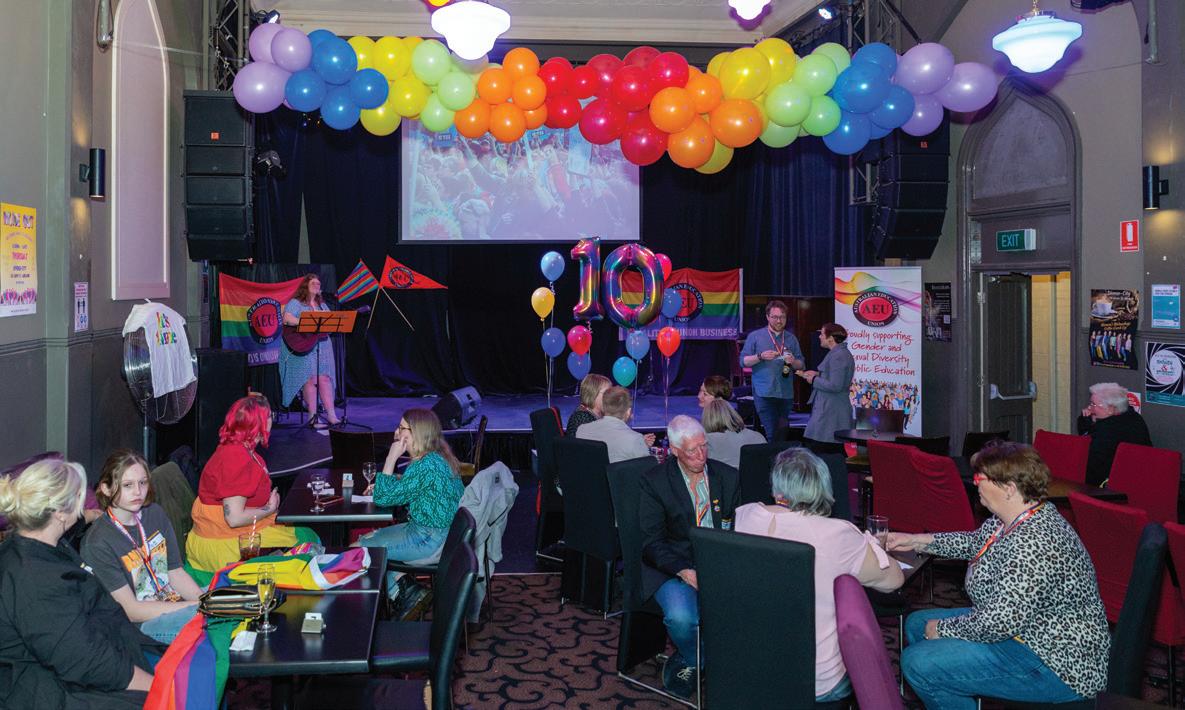
Lara Watson, an Indigenous Officer at the Australian Council of Trade Unions (ACTU) and the First Nations Workers Alliance (FNWA) gave a presentation on Voice, Treaty and Truth and the upcoming proposed referendum. This is about the importance of having a First Nations voice to our Federal Parliament. We all need to do our part to educate ourselves, our colleagues, families and communities on why this is so important.
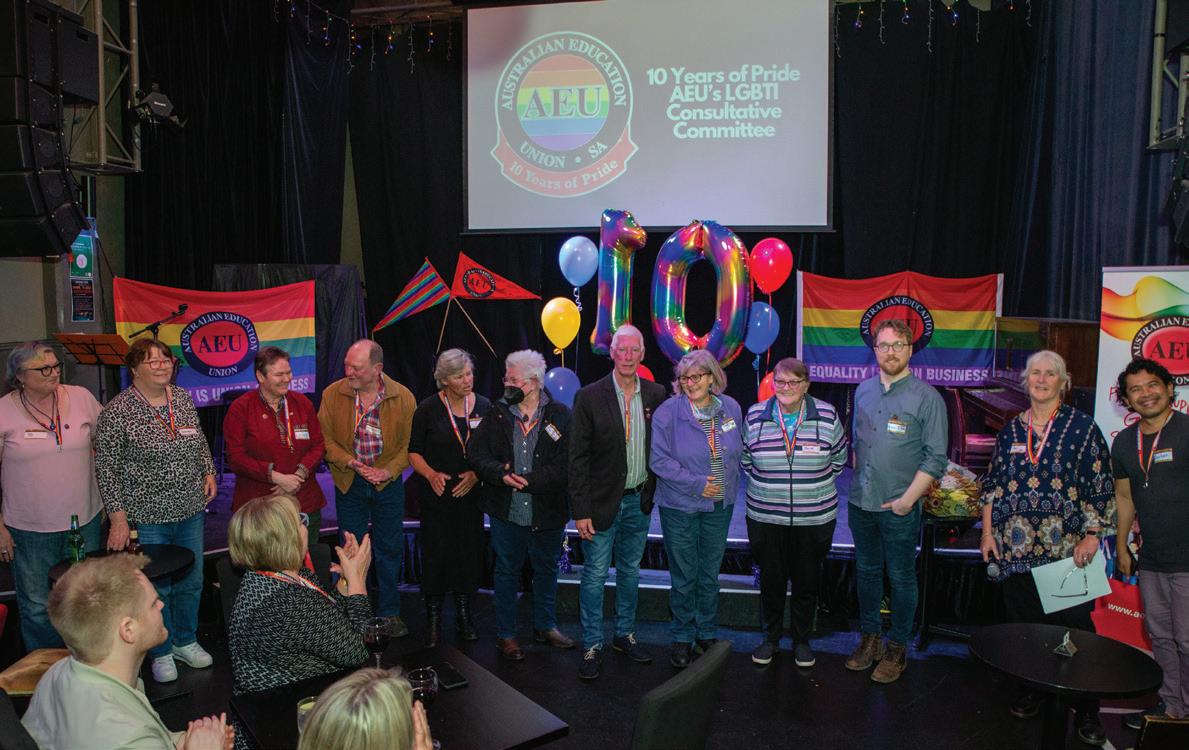
AEU SA Journal | 21 ABORIGINAL FOCUS
Above: AEU LGBTI Consultative Committee
Background image: Sourced from World Indigenous Peoples' Conference on Education (WIPCE.2022.net)
Members participated in workshops after lunch sharing their experiences from the recent World Indigenous Peoples Conference on Education (WIPCE), a special presentation about superannuation and why it’s important to be across how it works, and an Aboriginal Education Workers hot topics session, which looked at conversion to permanency, recruitment and other important issues through an Aboriginal lens.
The Aboriginal Members Conference is open to all Aboriginal AEU teachers, leaders, and members. Planning is under way for the conference in 2023.


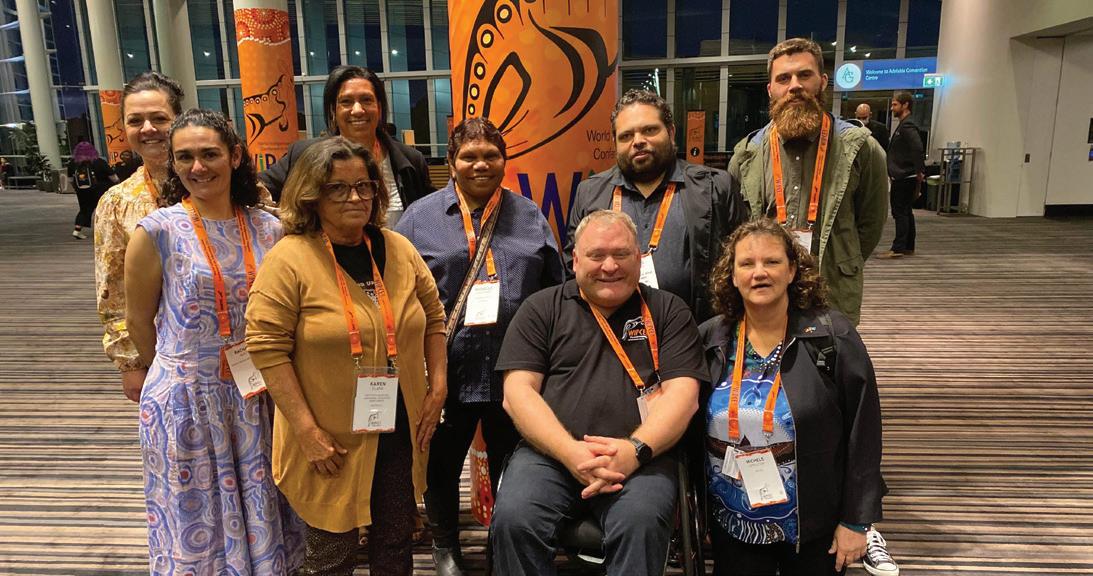
Right: AEU Aboriginal Members networking at the Aboriginal Members Conference.
Connecting at the World Indigenous Peoples’ Conference
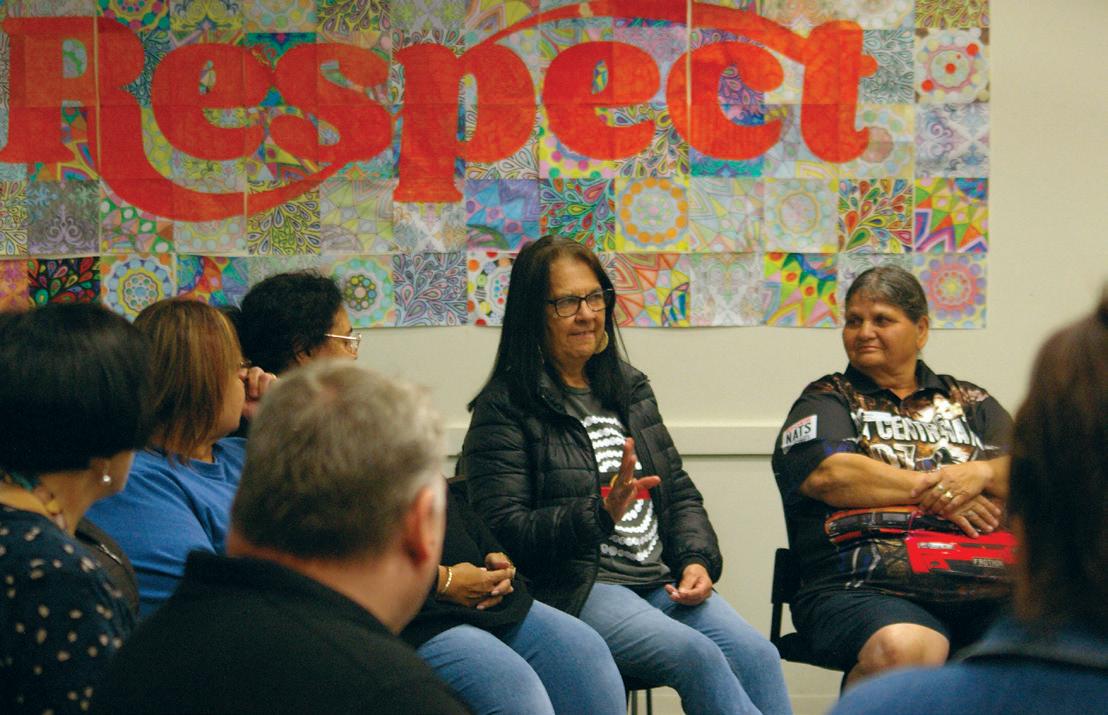
Taking place from 26-30 September at the Adelaide Convention Centre, the World Indigenous Peoples' Conference on Education (WIPCE) brings Indigenous educators together from across the globe in a festival of knowledge sharing, scholarship, and solidarity.
What a privilege to have attended the World Indigenous Peoples' Conference on Education (WIPCE) alongside our members with the support of the AEU. Running across five days in late September, the event featured a rich and varied program of speakers, interactive workshops, and forums. We were able to meet people from First Nations countries from across the world and build connections with them.
The highlight of the opening day was the Parade of Nations. Educators from many nations took part, introducing themselves and telling us about their culture. We sang in language, sharing a song that represented their people and their lands. It was very powerful.
Wednesday night we attended the conference dinner, which was an amazing experience. The entertainment had everyone on their feet, the dance floor was pumping. It was beautiful to see all our nations dancing together. It was an electrifying atmosphere that you couldn’t help but get caught up in. The combination of elements across the conference, the keynotes coupled with the dinner, provided incredible opportunities to further networks with our brothers and sisters from across the waters.
One of the recurring themes of the conference was the difficulty we all face in trying to get our First Nations culture and language in schools. Many of the barriers are the same across nations: funding, finding the appropriate people to deliver the programs, agreeing upon the qualifications needed to teach the programs, and of course, navigating prejudice and engaging with people who are openly opposed to it being taught.
There is a long way to go in getting our culture and language taught in our schools, preschools and recreational training. However, having the opportunity to work alongside other First Nations brothers and sisters has provided me with a newfound strength. Knowing that if we stand together and continue to advocate for change, we can achieve anything.
WIPCE 2025 will be held in Aotearoa New Zealand.
MICHELE APPLETON CAMPAIGN ORGANISER (ABORIGINAL
FOCUS), AEU SA
ABORIGINAL FOCUS
Above: AEU Aboriginal Members attended the World Indigenous Peoples' Conference on Education in September.
Professional Learning
Your AEU SA membership gives you access to values-based professional learning that helps to develop your practical skills.
The sessions are in real time and allow you to work with other professionals to gain insight and grow as an educator.
AEU SA New Educators' Conference
+ Date and time to be announced in 2023
+ Cost: Free for members
+ For: Full AEU SA members in their first three years of teaching
If you are in your first three years of teaching this conference is for you! Join us for two day's of connection, inspiration and sharing.
Hear from guest speakers, hone your skills in workshops and get involved in networking sessions for your wellbeing.
Topics include classroom management, rights and entitlements, e-safety and secure work campaigning.
Classroom Management and Engagement Strategies
+ Tue 18 - Wed 19 April, 9.15am – 3.30pm
+ Cost: AEU SA members: $99 | Staff working in public education who are not currently an AEU member: $333
+ For: Teachers, leaders and ancillary staff currently working in public education
A two day course to discover new ways to engage students and create safe and accountable classroom spaces.
AEU Merit Selection Training 2023
+ Tue 10 January, 10:00am - 12:00pm
+ Cost: Free for members
+ For: AEU Members who wish to become an AEU Representative on panels.
A two hour retraining session for AEU members who last attended Merit Selection training in 2017 or AEU Members who want to be an AEU Representative on Merit Selection Panels.
Key
Online/ Virtual In Person
Check the AEU SA website regularly for more dates and courses at aeusa.asn.au/upcoming
Member Education Podcast
Tune in to AEU SA Education Director, Sam Lisle-Menzel, and AEU SA Members
WORK SMARTER, NOT HARDER!
ANNIKA AGAR, PARALOWIE KINDERGARTEN
Join Annika and Sam as they discuss three practical tips for reducing your workload in preschools
THE JOYS OF CLASSROOM SET UP
EMMA ROBERTS, GOOLWA PRIMARY SCHOOL
The podcast looks at the joys behind classroom set up and the ups and downs this Early Career Teacher went through. From pretty to purposeful this podcast aims to address all the day one worries and Pinsta classrooms. Check out Part 2 in Episode 4 to see how Emma pulled off her classroom ideas!
Ep 3 ... The Joys of Classr... Part 1
AEU SA Journal | 23
TRAINING & COURSES
as we build professional development and learning opportunities, wherever you are.
to
Scan here
press play aeusa.asn.au/podcasts
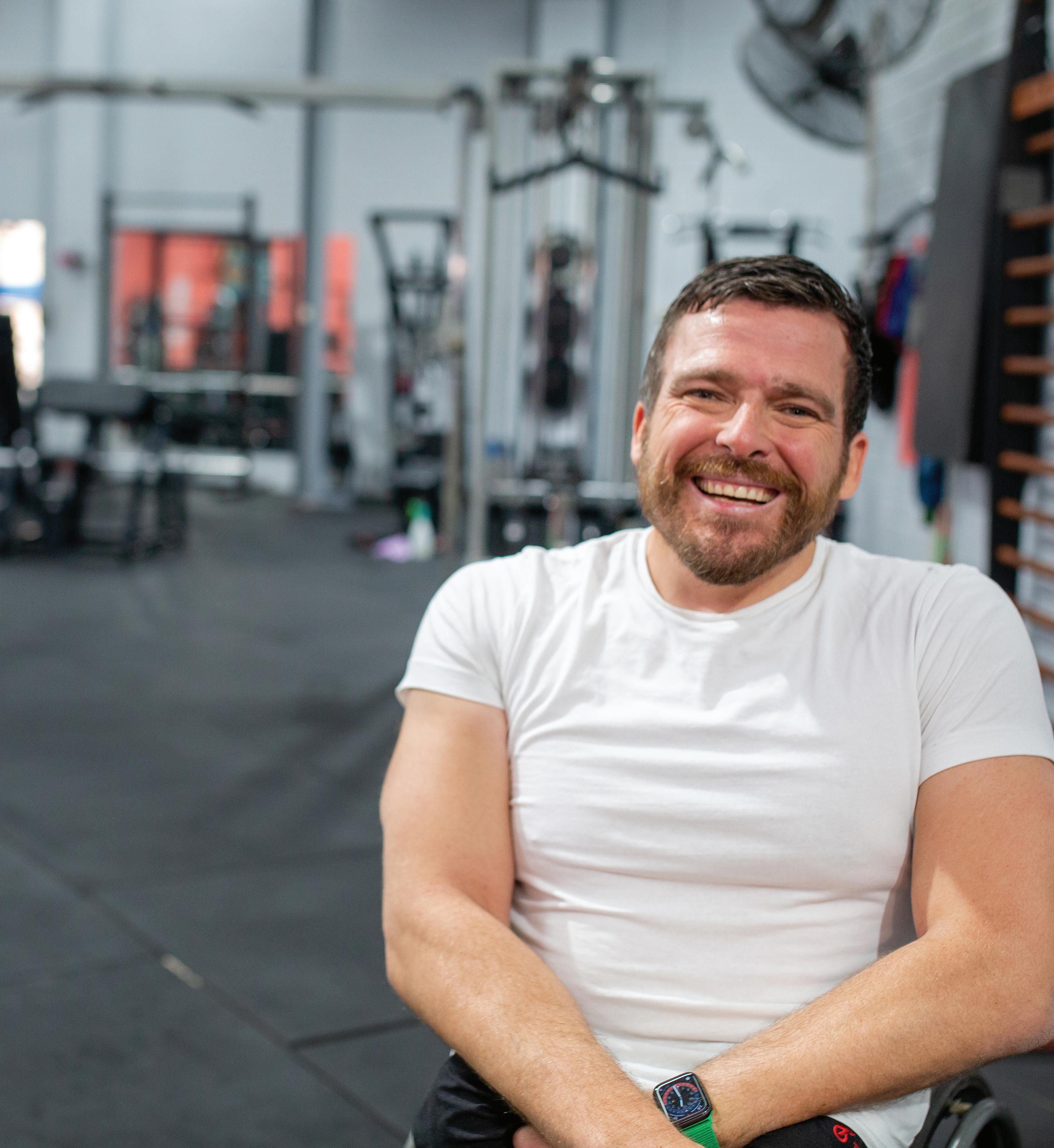




















 CALLUM PENLEY CAMPAIGN DIRECTOR, AEU SA
CALLUM PENLEY CAMPAIGN DIRECTOR, AEU SA






 DEAN CAMPAIGN ORGANISER
DEAN CAMPAIGN ORGANISER










